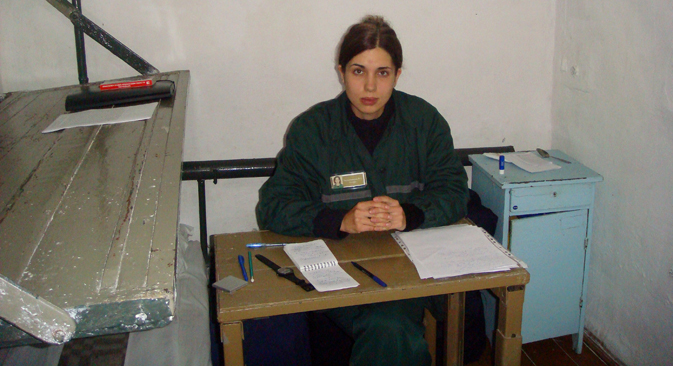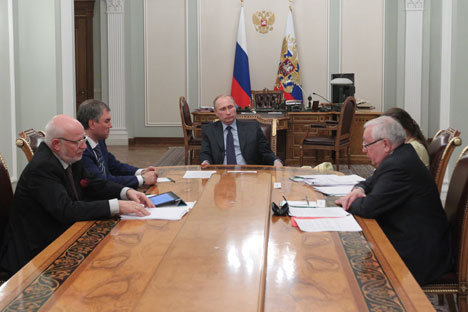
Pussy Riot members could be realised. Source: AFP / East News
Former oil tycoon Mikhail Khodorkovsky and members of the punk rock band Pussy Riot could be released early if the Russian parliament adopts a proposed amnesty bill that would apply to non-violent offenders, mothers, and prisoners who have already served most of their sentence.
The bill’s introduction was timed to coincide with the 20th anniversary of the adoption of the Russian constitution. If the bill passes as proposed, human rights advocates said they believe there would be a chance that Khodorkovsky and Platon Lebedev could be released under the amnesty, since they have already served two-thirds of their sentence, so it would be wrong to leave them behind bars.
Khodorkovsky and Platon Lebedev, are serving terms in Russian prisons for embezzlement and money laundering, charges critics claim are politically motivated. Two members of Pussy Riot, Nadezhda Tolokonnikova and Maria Alyokhina, are serving terms for hooliganism after staging an anti-Kremlin protest song in Moscow’s Church of Christ the Savior.
The head of the Council for Human Rights (CHR), Mikhail Fedotov, and Human Rights Commissioner Vladimir Lukin met last week with President Vladimir Putin to advocate for the amnesty bill.

President Putin met with the head of the Council for Human Rights, Human Rights Commissioner. Source: Konstantin Zavrazhin / RG
The CHR approved the draft of the broad amnesty bill, which includes early release of prisoners convicted of non-violent crimes, Rossiyskaya Gazeta reported. President Vladimir Putin said he agreed with the CHR proposals on the whole, but added that the draft bill still required some improvement.
"We are going to improve this document together with the Russian Duma members,” Putin said, instructing Lukin and Fedotov “to engage in this work in the most energetic manner."
Putin added that the amnesty should apply only to those “who have not committed any serious crimes, or crimes that involved violence against representatives of the authorities, meaning, first and foremost, representatives of the law-enforcement agencies."
In Fedotov’s opinion, if the bill passes, the amnesty will be fairly broad.
"According to the CHR estimates, we are talking about 100,000 prisoners to be released early," he said. Lukin’s estimate were more conservative at 50,000 people.
Judging from the Russian president’s comments, the amnesty bill could apply also to one female defendant in the Bolotnoye Affair, when demonstrators protest in Moscow in 2012 on the eve of Putin’s third inauguration.
However, the fate of other high-profile prisoners, including Khodorkovsky and members of the Pussy Riot band, remains unclear. The crimes of which they have been convicted are categorized as non-violent but serious.
It is not quite clear what Putin had in mind when he spoke about amnesty for people “who have not committed serious crimes,” and if he meant "serious" in the conventional sense or as defined by the Penal Code.
A source in the president’s administration told the Gazeta.Ru news website that the jailed Pussy Riot members will probably be released under the amnesty as mothers with underage children.
Experts propose amnesty for Russia's illegal immigrants
Navalny may be subject to planned amnesty - Human Rights Council head
20th anniversary of Constitution is good reason for new amnesty - official
The jail term they are currently serving ends in March 2014.
Fedotov said he is confident the president agrees with the overall concept of the amnesty proposed by the rights advocates.
“The proposals made by members of the CHR focus on people jailed for non-violent crimes, regardless of how these crimes are categorized in the Penal Code," Fedotov told Gazeta.ru. “My understanding is that on the whole, Putin agrees with our concept."
“But it is still too early to say what the final version of the amnesty bill will look like," Fedotov went on to say. "I don't want to raise any false expectations by making any predictions. It will be better if the actual bill exceeds our expectations.”
Vladislav Grib, a member of the Public Chamber, a Kremlin-appointed government body tasked with monitoring the parliament, explained that the amnesty procedure applies to categories of the prison population rather than individual convicts, so the release of these people under amnesty will be a purely judicial procedure, without any politics involved.
“If Pussy Riot members fall under the criteria stipulated in the amnesty bill, they will certainly be released, along with vast numbers of convicts the public has never heard of.”
Vladimir Osechkin, a member of the Council for Public Controls in the Russian Duma, echoes this view. He is confident that the Pussy Riot women will be freed.
"They fall under a whole number of criteria that should qualify them for release. This is their first conviction; the crime is not serious; they have been sentenced to less than five years; and they have underage children," he said. “Of course, it is hard to be certain because the Russian Duma has yet to approve the bill - but the likelihood of their release is high."
Osechkin added that under one of his proposals, the broad amnesty should also rescind any disciplinary action taken against all prisoners, regardless of whether they actually qualify for early release.
This means, for example, that convicts will be freed from punitive confinement within jails, and all similar disciplinary measures will be rescinded. Under the current law, when these measures are in place, the convicts cannot appeal for early release; they are not allowed visits by family members, and they cannot receive any items from home, he said.
Passing this version of the bill “would be a really humane step," he said.
The Duma will begin consideration of the amnesty bill as soon as it is officially submitted.
All rights reserved by Rossiyskaya Gazeta.
Subscribe
to our newsletter!
Get the week's best stories straight to your inbox